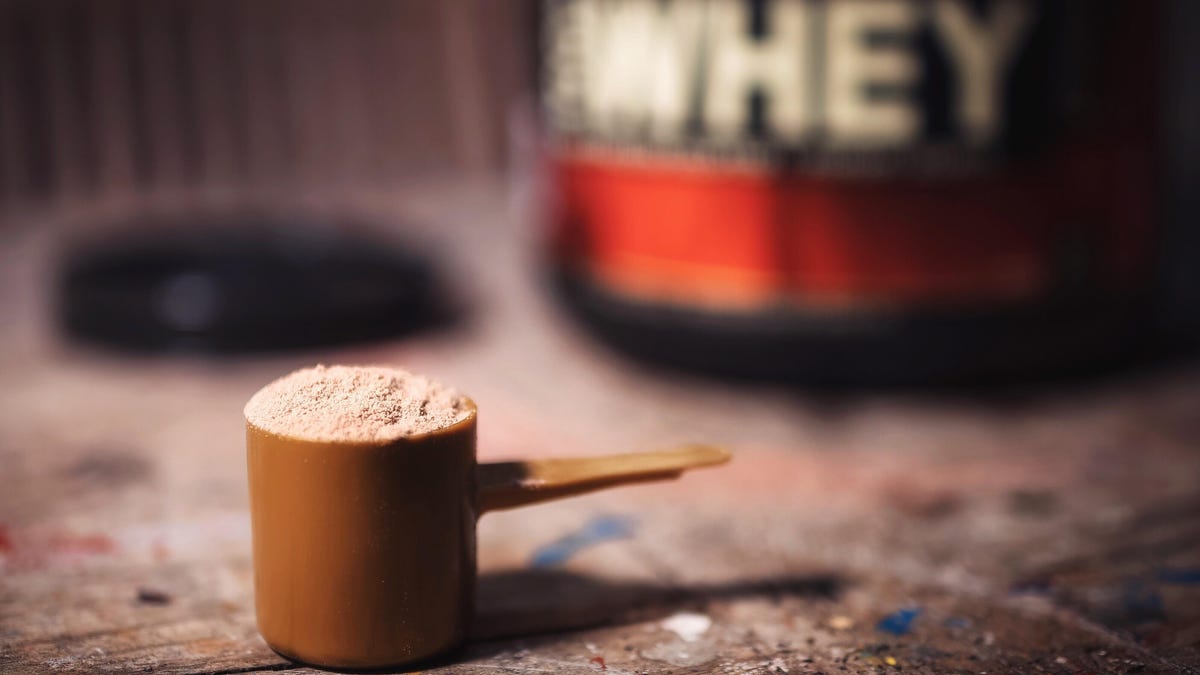Beware of TikTok's latest fitness trend: 'Dry scooping' preworkout powder
TikTokers are eating preworkout supplements dry, instead of adding water. An expert explains the trend and why it's riskier than it looks.

Gulping down a mouthful of dry preworkout formula is one of the latest "wellness" trends to make waves on social media, and some experts -- and participants -- are sounding the alarm.
A "preworkout" is a supplement that some athletes use before exercise to boost their performance. There is a range of preworkouts with different formulas out there, but many contain B vitamins, amino acids, high amounts of caffeine and other (sometimes risky) ingredients. It typically comes in powdered form, with instructions to mix with water.
Enter the "dry scoop" challenge, which has encouraged TikTok users to swallow a mouthful of the stuff without the recommended dilute-with-liquid step. Some people cough, most people cringe from the taste and at least one woman said she suffered a heart attack, Independent reported. In one video, a nutrition store employee challenges a man to swallow a scoop of habanero-flavored preworkout powder. The man does it, and is promised an energy drink as a prize.
Why are people dry scooping? "The intention is for these amateur athletes, or athletes, to allow the preworkout supplement to take effect more quickly by ingesting it all at once versus diluting it," says Cassie Vanderwall, a clinical dietician at UW Health. "However, it is quite harmful and quite risky for several reasons." To clear up the information surrounding this controversial challenge, we talked with Vanderwall to discuss the dangers of dry scooping, and whether you really need a preworkout supplement in the first place.
What are the risks of dry scooping?
The first major risk to dry scooping, Vanderwall says, is inhaling the powder. "When you do dry-scoop, if you breathe in or you start coughing, the contents can go in your lungs and increase your risk of an infection," she says. (Coughing and spraying out dry powder is a common occurrence in many of the challenge's videos.)
@kimg966 This is sign don’t try it lmao #gymshit
♬ busy doin hot girl ish - Chelsea
"The other piece is there are ingredients in those supplements that, when ingested in higher amounts, may have more potent effects [that] possibly would be considered a side effect," she explains. "Because they are intended to be consumed over time, not all at once." For example, a dry scoop of preworkout may contain as much caffeine as three or four cups of coffee, Vanderwall says. "Not many people would consume all of that in one sitting either."
Caffeine, a stimulant, most commonly causes heart palpitations when consumed too quickly or in too large an amount, Vanderwall says. Other ingredients commonly found in preworkouts that aren't good to consume in one gulp include beta alanine, high-dose B vitamins and creatine, which can cause stomach upset if consumed too quickly, she says.
OK, no one should dry-scoop. What if I want to do it anyway?
If you're insistent on dry scooping, Vanderwall says informing your primary care physician is a good move to assess your individual risks.
"Typically, what we do when clients come in with ideas that are quite risky is we lay it out," Vanderwall says. "What's the pro? What are the cons? Why are you doing it, and is there a way to satisfy that 'why' or rationale with a healthier method?"
Preworkout should be consumed as directed by the label -- not swallowed dry.
What's the healthy way to consume a preworkout?
Oftentimes, people consume preworkout for an extra boost of energy to complete a workout, according to Vanderwall. If that's the case, a simple change in the time of day you choose to work out may be helpful -- working out at later in the morning, for example. If you still prefer a preworkout formula, Vanderwall advises athletes to follow the directions on the label, which means mixing the powder in liquid, and drinking it over a period of time.
"Sometimes people enjoy a preworkout as they're going to work out, as well as [during] the earlier parts of their workout," Vanderwall says. "And that slow ingestion gives them more sustained impact from the supplement."
What should I look for in a preworkout drink?
Although it depends on the type of workout, and what you're wanting from your exercise routine, there are a couple of key ingredients to look out for -- either in a preworkout formula or in regular food.
If you're looking to build muscle and increase mass, Vanderwall says, "having a pool of amino acids there and ready" as the muscles are being torn down is helpful. Animal products, whey and soy contain these protein building blocks, Vanderwall says (though whey and soy contain them in lower amounts). Creatine can also increase muscle mass, she added.
Workouts that result in heavy sweating and last 60 to 90 minutes, she says, may require some electrolyte replacement through potassium or sodium. Most preworkouts meant to "stabilize and sustain" activity typically contain some electrolytes (as do sports drinks), as well as some kind of branched-chain amino acid, Vanderwall says.
Is a preworkout supplement necessary for a quality workout? "I would say that it's not a necessity, it's more of a want," Vanderwall says. "I think if people want that extra boost, or if they're hitting the gym early in the morning and they have their sleepy eyes on, I think there are benefits. But you could probably find that in a standard cup of coffee and not a fancy scoop."

